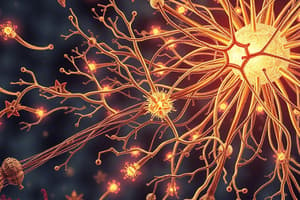Podcast
Questions and Answers
What is a p–n junction?
What is a p–n junction?
A boundary or interface between p-type and n-type semiconductor materials inside a single crystal of semiconductor.
What is the difference between the 'p' and 'n' sides of a p–n junction?
What is the difference between the 'p' and 'n' sides of a p–n junction?
The 'p' side contains an excess of holes, while the 'n' side contains an excess of electrons in the outer shells of the electrically neutral atoms there.
How does the structure of a p–n junction allow electric current to pass through it?
How does the structure of a p–n junction allow electric current to pass through it?
It allows electric current to pass through the junction only in one direction.
How are p–n type regions created in a p–n junction?
How are p–n type regions created in a p–n junction?
What are the applications of p–n junctions in semiconductor electronic devices?
What are the applications of p–n junctions in semiconductor electronic devices?
Flashcards are hidden until you start studying
Study Notes
Fundamentals of p–n Junctions
- A p–n junction is a type of semiconductor device that combines two types of materials, p-type and n-type, to create a junction with unique electrical properties.
Composition of p–n Junctions
- The 'p' side of a p–n junction is created by doping a semiconductor material with a p-type dopant, which has an excess of holes (positive charge carriers).
- The 'n' side is created by doping a semiconductor material with an n-type dopant, which has an excess of electrons (negative charge carriers).
Functionality of p–n Junctions
- The structure of a p–n junction allows electric current to pass through it because the p-side has an excess of holes, while the n-side has an excess of electrons, creating a depletion region at the junction.
- When a voltage is applied across the junction, the electrons from the n-side fill the holes on the p-side, allowing current to flow.
Creation of p–n Regions
- p–n type regions are created in a p–n junction by introducing dopant atoms into the semiconductor material through a process called ion implantation or diffusion.
Applications of p–n Junctions
- p–n junctions are used in various semiconductor electronic devices, including diodes, transistors, solar cells, and integrated circuits.
- They are also used in electronic components such as rectifiers, switches, and amplifiers.
Studying That Suits You
Use AI to generate personalized quizzes and flashcards to suit your learning preferences.




